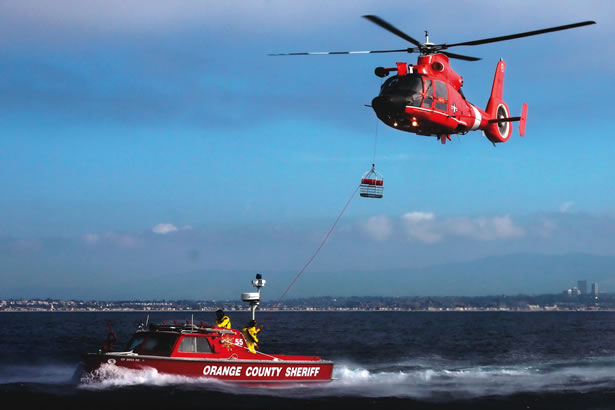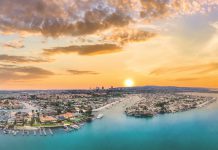Harbor Patrol
Every day in Newport Beach, Harbor Patrol takes on unique challenges, from putting out fires to saving stranded vessels.- By Jason Sanford | Photos courtesy of OCSD marine operations
Deputy Dennis Breckner is not a novice to the force; he’s “been there, seen that” as a 15-year veteran of the Orange County Sheriff’s Department—except, of course, for the time that 35-year-old Sloan Briles threw his 10-year-old son overboard from a harbor cruise and then belligerently resisted arrest at the hands of the Orange County Sheriff deputies—he’d never seen that before.
“That was crazy, that this guy would do that to his own son in the middle of a busy harbor,” he says. “That brings up all sorts of child endangerment charges, and then he went limp on purpose when deputies tried to arrest him.”
Thankfully, it’s not every day that Harbor Patrol deputies have to worry about kids being thrown overboard by their drunken, manic fathers, but alas, it is one of the many things that they’re prepared for.
“Our job description includes a lot … it’s very extensive learning,” explains Deputy Gary Lewellyn, also a 15-year veteran of the department.
In addition to patrolling and enforcing the laws in Newport harbor—from speeding to reckless behavior—the Harbor Patrol conducts search and rescues as well as a hodgepodge of Homeland Security missions all the way up and down the 43 miles of Orange County coastline, including inside and outside the Huntington, Newport and Dana Point harbors.
Beyond the Harbor’s Mouth
It is essentially a bit of a misnomer to just call them Harbor Patrol, as their job extends far beyond the calmer waters of the harbor. One of their chief responsibilities includes search and rescue and towing missions that take them far out into the open ocean, which, depending on the weather, can be less than hospitable to their boats—or any boats for that matter.
“You’ve always got to think about the elements; you never know what the wind is going to do, what the tide is going to do, what the swell is going to do,” Dennis says. “It keeps your mind busy for sure when you’re engaged in a rescue.”
High swells, complete darkness, pouring rain, gale-force winds—none of it is enough to keep these officers of the sea from saving the passengers of a disabled, rapidly sinking ship.
Gary recalls an SOS that came in one night off a stranded boat that was sinking nearly 20 miles off the coast: Harbor Patrol responded and quietly expected to not find the vessel, considering the complete darkness and adverse weather conditions that would likely push the boat away from its last known location. Lo and behold, he and another deputy sped out in the middle of the night and did find the boat, akin to actually finding the needle in the haystack, in the pitch-black as the water was approximately ankle high in the boat.
“We weren’t so sure we’d be able to find them out there in the dark and all the wind, but thankfully we got to them in time,” Gary says.
But this is par for the course in a job that could have officers putting out a boat fire one moment and lending crucial support to local lifeguards at The Wedge during high swells that very same day. The Harbor Patrol’s officers are trained to handle the forces of nature and the toughest elements—both natural and manmade—that they could possibly encounter on the high seas.
Docking, Diving and Other Dangers
Harbor Patrol’s role is so expansive that they’re the first responders and first line of defense anytime anything dangerous, wild or out of the ordinary occurs in and around the harbor.
“A couple weeks back we got a gas in the bilge call, which, when [gas] fills up the boat, turns it into a bomb … essentially you’re now dealing with a bomb in the harbor,” Dennis explains.
So these two deputies of the sea donned their full, head-to-toe firefighting gear, including their self-contained breathing apparatuses and proceeded to respond to the call, where they were able to help the boat owner release the hazardous gasoline fumes before they could ignite and cause catastrophic consequences as seen in November 2011 in Huntington Harbour.
A similar, more tragic situation happened aboard a 26-foot speedboat in the Huntington Harbour where gas filled the bilge and ignited violently, sending everyone aboard flying into the water with severe injuries and broken limbs due to the explosion. Luckily, no one was killed as the boat quickly became a bomb and detonated from an electrical spark below. Huntington Harbour’s branch of deputies helped contain that situation by rescuing the boaters and putting out the flames as quickly as possible.
This time around, Dennis and Gary’s timing was perfect in Newport Harbor, as they helped a family aboard the boat avert potential disaster—and the Harbor Patrol felt confident in their equipment and training to take on the situation.
“The same thing that you would have at a fire station is with every deputy … we respond from here because this is essentially our fire truck,” Dennis explains. “On board, every [patrol] boat is a self-contained breathing apparatus, fins, mask—in the event that we do have to go in the water.”
In addition to the less common and higher-risk calls, Harbor Patrol also is responsible for salvaging and towing derelict boats that are abandoned or drift away from their moorings.
“All the knots you have to learn how to tie so that you can secure a 30 or 40,000-pound vessel are key … you may only have one shot to dock a million-dollar yacht and you don’t want to damage property or lose it,” Gary says.
When a boat has to be towed back from the ocean into the harbor because it runs out of gas or stops working, Harbor Patrol has to tie that baby down and make sure to use the correct alignment for the tow job required. The deputies use a side-tie for boats already inside the harbor so that they can have greater control over the boat in a tighter, obstacle-filled environment; while they use a standard behind-the-boat tow for vessels that die out on the high seas—the key to which is allowing enough space in between the two boats so that they don’t run into each other if the boat in front suddenly has to brake or hits a big swell.
Specialized Training
 There’s lots to do and lots to think about for sure. Of course, it helps to have plenty of allies in the area too.
There’s lots to do and lots to think about for sure. Of course, it helps to have plenty of allies in the area too.
“We have a good relationship with all the agencies in the area because we rely on them to help us too—Newport police, the Coast Guard, the local lifeguards, paramedics,” Gary says.
Is it safe to say that these guys don’t just cruise around and check tan lines all day long?
“We have to go through our regular training—going through the police academy, we have to go through our jail training, our jail years, our patrol training, stay on patrol—deputies out here do at least five years patrol before they can come here—and then it’s three months learning how to be a firefighter in a marine environment. I just shake my head and laugh when guys come up to us and say our job is nothing but sunshine and bikinis,” Dennis says, smiling.
Gary frames it with his own personal kernel to end the day at sea.
“When you’re on patrol on land, the guy you’re putting in the backseat in handcuffs isn’t necessarily thrilled that you’re doing your job—it’s a little different out here; people are so thankful that you’re here to help them have a great time out on the water.” NBM








